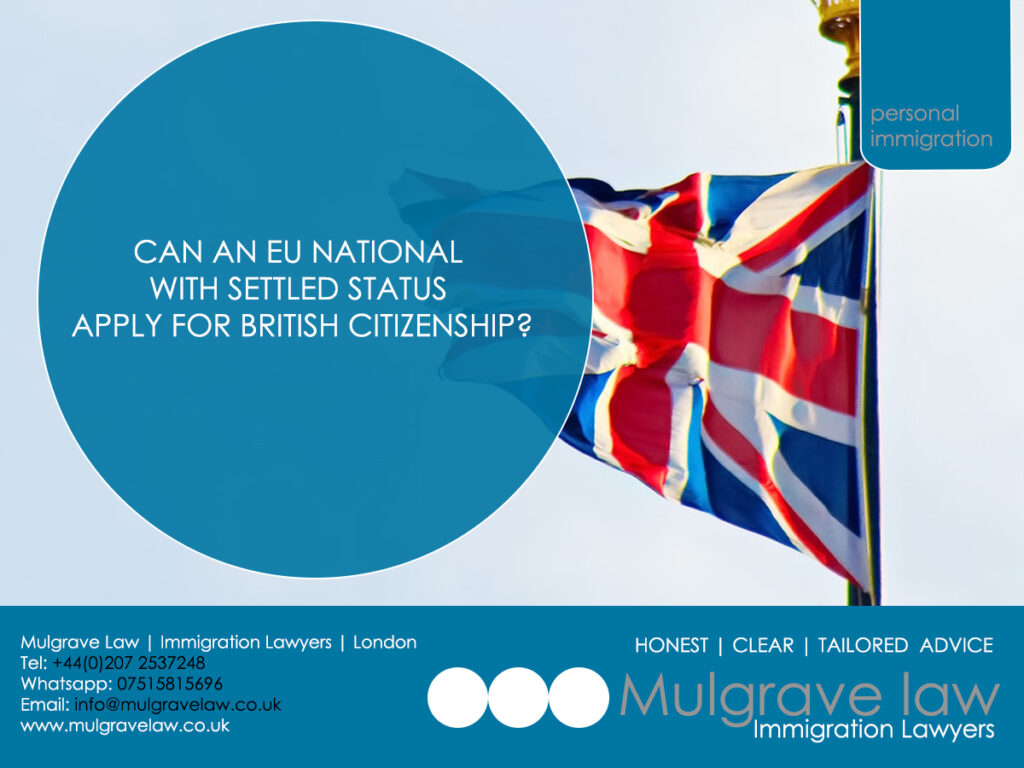Ever since the UK left the European Union, the Home Office data suggests that there has been an influx in naturalisation applications from EU citizens. EU nationals with settled status can also apply for British Citizenship; however you must bear in mind that the Home Office has updated their ‘good character’ requirement making it harder for EU nationals to gain British Citizenship.
What are the requirements to naturalise as British Citizen?
- be 18 or over;
- Meet the “good character” requirement;
- have an intention to continue to live in the UK;
- meet the knowledge of English and life in the UK requirements;
- meet the residency requirement.
Applicants will need to meet all requirements as set out by the British Nationality Act 1981. However, many EU nationals have now noted that the updated good character has had unexpected consequences.
How does the ‘Good Character Requirement’ affect EU nationals applying for British Citizenship?
Any applicant who is over the age of 10 needs to be of good character to be registered or naturalised as a British citizen. The good character policy guidance, details how the Home Office caseworkers assess a person’s good character when making a decision. They predominantly take the following factors into consideration:
- Criminality
- International crimes, terrorism, and other non-conducive activity
- Financial soundness
- Notoriety
- Deception and dishonesty
- Immigration-related matters
- Previous deprivation of citizenship
As part of this requirement, the Home Office will a consider whether any of the above factors suggest that you are not of good character.
One of the most controversial of these factors is the assessment under ‘Immigration related matters’. The Home Office is obliged to assess if you have ever breached immigration law. Whilst most unsuspecting applicants might think that they have never breached any immigration laws, it might be best to inspect your residence in the UK in detail (especially in the case of EU nationals)!
The Home Office will look at your entire period of residence in the UK, or the last ten years; whichever is shorter and assess if you have ever breached immigration rules. To avoid a breach of immigration law, EU nationals must show that their residence has been in accordance with EU free movement law, as implemented in the UK by the Immigration (EEA) Regulations 2016. EU nationals will need to prove that they exercised treaty rights in one of the following categories:
- Worker
- self-employed
- job seeker
- self-sufficient/student with a comprehensive sick insurance (CSI).
EU nationals are granted settled status under the EUSS where they have resided in the UK for a continuous period of 5 years. However, a grant of settled status under the EUSS does not confirm that the person has complied with immigration requirements during that time, as this is not a requirement of the EUSS. Many EU nationals now submitting applications for naturalisation are falling foul of the ‘good character’ requirement and are faced with refusals.
The Home Office caseworker are now obliged to assess an EU national’s Immigration history for up to 10 years leading up to their citizenship to ensure that they were legally resident during that entire period.
If you have an EEA permanent residence card, the Home Office will accept that you complied with immigration requirements for the relevant 5-year period of residence and thereafter. However, if the permanent residence card does not cover your whole residence period (up to 10 years), you still have to prove that you were a legal resident for the remaining time period spent in the UK.
If you were living in the UK as a student/ self- sufficient person, you must also prove that you had CSI or an EHIC. Failure to have the above could mean that you were non-compliant with the Immigration requirements.
Whilst the assessment looks stringent, we also need to bear in mind that the Home Office caseworkers have a certain amount of discretion that they can use whilst dealing with such applications. However, how discretion is exercised by an individual caseworker cannot be guaranteed.
If you are affected by the good character requirement, but still intend to make an application for naturalisation, you can do so. However, it is important to seek professional advice from an Immigration lawyer who would be able to advice if it is sensible to apply and request a caseworker to exercise discretion in your case. If the application is refused, you stand to lose your application fee of £1,349.20 – hence you are better safe than sorry!
Who can I contact for help with my Visa Application?
Our Lawyers and Solicitors at Mulgrave Law are specialists in the field of UK Immigration Law;we have a reputation for being trusted, for taking on complex immigration cases and providing successful outcomes. We provide both corporate Immigration Services as well as Personal Immigration services across London and across the globe. Our Lawyers are some of the Best Immigration Advisers with a wealth of experience in dealing with UK Immigration and Nationality applications.
How can Mulgrave Law help? We would be more than happy to speak to you and assess your eligibility for British Citizenship if you are worried about the good character requirement through our free consultation (up to 30 minutes). If you are looking for Top Immigration Lawyers in London or Top Immigration Solicitors in London, get in touch with us. If you decide to instruct us, we guarantee we will have top Immigration Lawyers and top Immigration Solicitors in London working on your case at the most reasonable charges.
